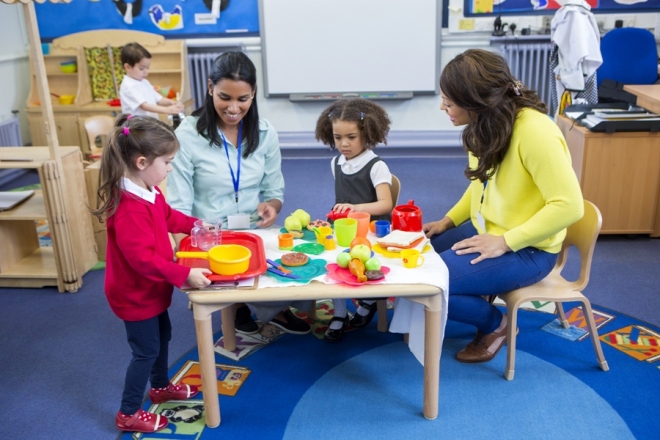Is Daycare Harmful? A Critical Look At Childcare Choices For Working Parents

Table of Contents
The Potential Benefits of Daycare
Daycare offers numerous advantages that contribute to a child's holistic development and provide significant relief for working parents. Let's explore some key benefits:
Socialization and Development
Daycare provides unparalleled opportunities for socialization, crucial for a child's emotional and social growth.
- Peer Interaction: Children learn to interact with peers of various ages and backgrounds, developing essential social skills like sharing, cooperation, negotiation, and conflict resolution. This social interaction is vital for learning empathy and understanding diverse perspectives.
- Enhanced Creativity and Emotional Intelligence: Exposure to different play styles, activities, and perspectives fosters creativity and emotional intelligence. Children learn to express themselves, manage their emotions, and understand the feelings of others.
- Improved Skills:
- Improved communication skills through constant interaction.
- Increased independence through self-care activities and group participation.
- Enhanced problem-solving abilities by navigating social situations and resolving conflicts.
Academic Preparation
Many high-quality daycare centers incorporate structured learning activities that provide a strong foundation for future academic success.
- Early Learning Advantage: Early exposure to literacy and numeracy concepts gives children a significant head start in preschool and kindergarten. This early introduction to academic concepts can boost their confidence and learning abilities.
- Pre-Academic Skill Development: Daycare programs often introduce children to basic reading and math skills, fostering a love for learning from an early age. They also focus on developing pre-academic skills like fine motor skills, hand-eye coordination, and cognitive development.
- Diverse Learning Styles: Reputable daycares cater to various learning styles, ensuring that each child can learn and grow in a way that suits their individual needs and capabilities.
Parental Relief and Career Advancement
Access to reliable childcare is often a necessity for parents to maintain their careers and financial stability.
- Career Opportunities: Daycare allows parents to pursue career opportunities and advance professionally, knowing their child is in a safe and nurturing environment. This contributes to family well-being and economic security.
- Work-Life Balance: Reliable childcare reduces parental stress and contributes to a better work-life balance, leading to a more harmonious family life. Parents can focus on their work without the constant worry of childcare logistics.
- Reduced Financial Strain: While daycare costs can be substantial, the financial benefits of dual-income households often outweigh the expense, particularly when considering career advancement opportunities.
Potential Drawbacks and Concerns about Daycare
While daycare offers numerous benefits, it's crucial to acknowledge potential drawbacks and address concerns.
Exposure to Illness
Daycare settings can expose children to a higher risk of common childhood illnesses, such as colds, the flu, and other contagious diseases.
- Increased Infection Risk: The close proximity of children in daycare increases the chance of infection transmission. This is a common concern for parents, but it's important to consider the long-term benefits of building immunity.
- Building Immunity: While exposure to illness can be concerning, it also allows children to build their immune systems and develop natural immunity over time. This can lead to fewer illnesses in the long run.
- Antibiotic Overuse: It's essential to choose a daycare with a responsible approach to illness management, minimizing the risk of antibiotic overuse.
Quality of Care Variability
The quality of childcare varies dramatically between different centers. Choosing a reputable provider is paramount.
- Staffing Ratios and Qualifications: Look for centers with appropriate child-to-adult ratios and highly qualified, experienced caregivers. Thorough background checks for all staff members are crucial.
- Stimulating and Safe Environment: A high-quality daycare provides a stimulating and safe learning environment with age-appropriate activities and equipment.
- Licensing and Accreditation: Choose a licensed and accredited daycare center, as this indicates a commitment to meeting specific safety and quality standards.
Separation Anxiety and Adjustment Issues
Some children experience separation anxiety when starting daycare, which is a normal part of the adjustment process.
- Gradual Transition: A gradual transition into daycare, allowing the child to adjust slowly, can help minimize separation anxiety. This may involve short visits before full-day attendance.
- Supportive Daycare Environment: A supportive and nurturing daycare environment, with patient and understanding caregivers, is crucial for easing the transition and building a child’s confidence.
- Parental Reassurance: Parental reassurance and a consistent routine can significantly help a child adjust to daycare and reduce separation anxiety.
Alternatives to Traditional Daycare
Several alternatives to traditional daycare exist, each with its own advantages and disadvantages.
In-Home Care
In-home care provides a personalized and intimate setting but can be more expensive and challenging to find.
Family Daycare
Family daycare offers a smaller group setting and a more home-like atmosphere, often providing a more personalized experience.
Nanny Care
Nanny care offers one-on-one attention but is typically the most expensive option.
Flexible Work Arrangements
Parents should explore flexible work arrangements such as telecommuting or flexible hours to reduce their reliance on daycare.
Conclusion
The question "Is daycare harmful?" doesn't have a simple yes or no answer. The potential benefits and drawbacks of daycare are complex and depend heavily on factors such as the quality of the center, the child's temperament, and the family's circumstances. By carefully weighing the advantages and disadvantages, considering alternatives, and choosing a high-quality childcare provider, parents can make an informed decision that best suits their family's needs. Ultimately, the goal is to create a nurturing and stimulating environment that supports your child's healthy development. Continue researching childcare options and make the best choice for your family to ensure they receive the best care possible. Remember to thoroughly research and choose a daycare that aligns with your values and priorities. Choosing the right daycare is a crucial step in your child's journey, so take your time and make an informed decision about the best daycare for your family.

Featured Posts
-
 What Is Rakesh Sharma Doing Now The Legacy Of Indias First Astronaut
May 09, 2025
What Is Rakesh Sharma Doing Now The Legacy Of Indias First Astronaut
May 09, 2025 -
 9 Maya Zelenskiy Ostalsya Odin Prichiny I Posledstviya
May 09, 2025
9 Maya Zelenskiy Ostalsya Odin Prichiny I Posledstviya
May 09, 2025 -
 The Real Jeanine Pirro An In Depth Look At Her Life And Work On Fox News
May 09, 2025
The Real Jeanine Pirro An In Depth Look At Her Life And Work On Fox News
May 09, 2025 -
 Dijon Psg La Fin D Une Serie En Arkema Premiere Ligue
May 09, 2025
Dijon Psg La Fin D Une Serie En Arkema Premiere Ligue
May 09, 2025 -
 Are You A True Stephen King Fan Test Your Knowledge With These 5 Books
May 09, 2025
Are You A True Stephen King Fan Test Your Knowledge With These 5 Books
May 09, 2025
